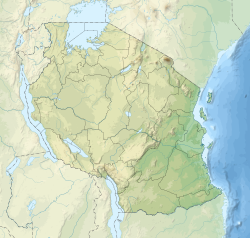Chwaka, Pemba
National Historic Site of Tanzania From Wikipedia, the free encyclopedia
Chwaka (Swahili: Magofu ya mji wa kale wa Chwaka) is a medieval Swahili historic site next to the village of Chwaka located in Micheweni District of Pemba North Region, Tanzania. There is an excavated Swahili mosque on the site.[2] The location of these ruins is 6 km (3.7 mi) from the small town of Konde, at the end of a trail that extends 900 m (3,000 ft) in the direction of the village of Tumbe on the way to the village of Myumoni.
 Chwaka Mosque, Micheweni District | |
| Location | Micheweni District, Pemba North Region, |
|---|---|
| Coordinates | 4°57′43.164″S 39°46′39.324″E |
| Type | Settlement |
| History | |
| Material | Coral rag |
| Founded | 13th century CE |
| Abandoned | 16th century CE |
| Cultures | Swahili |
| Site notes | |
| Ownership | Tanzanian Government |
| Management | Antiquities Division, Ministry of Natural Resources and Tourism [1] |
| Architecture | |
| Architectural styles | Swahili & Islamic |
| Official name | Chwaka Historic Site |
| Type | Cultural |
| inactive excavation | |
The archaeological site is clearly marked from the road and is open to the public. On the entire island of Pemba, these ruins are among the best kept. This location has early 13th-century inscriptions. However, Harun Bin Ali, the son of Mkame Ndune of Pujini.[clarification needed] The settlement, which covered an area of 20 hectares (49 acres) featured a grand palace-fortress, banquet halls, two mosques, an ironworks, and a harbor in a nearby creek. The town was abandoned in the 16th century.
The massive mosque's walls and its gate arches are still in place today. Remains (bowls, ceramics) that were discovered during excavations are now on display at the Albert Museum in London as well as the Stone Town Museum in Stone Town, which is temporarily closed due to the collapse of a portion of the old palace.[3] According to legend, Harun's wife requested that seeds be combined with the mortar to hold the little mosque known as Msikiti Chooko, or "the mosque of green grains," together. Several tombs, including Harun's, have been uncovered behind the mosque.[4]
See also
References
Wikiwand in your browser!
Seamless Wikipedia browsing. On steroids.
Every time you click a link to Wikipedia, Wiktionary or Wikiquote in your browser's search results, it will show the modern Wikiwand interface.
Wikiwand extension is a five stars, simple, with minimum permission required to keep your browsing private, safe and transparent.

